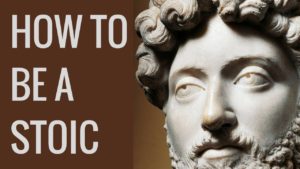By Rose O. Sherman, EdD, RN, FAAN
 Nurse leaders face many challenging situations and it can be difficult at times to remain calm. I remember my first leader (then called a head nurse). She was the calmest person I have ever encountered in healthcare. I asked her one day how she was able to remain so calm even in crisis situations. She told me she was a firm believer in Stoicism. This was well before any discussions about mindfulness, meditation or other strategies to reduce stress. In thinking back, it really did seem to work for her. Stoicism is a Hellenistic school of philosophy, founded by Zeno of Citium in the early 3rd century BC. Most famous practitioners of this philosophy include Epictetus, Seneca, and the great Roman emperor Marcus Aurelius who published meditations on the topic.
Nurse leaders face many challenging situations and it can be difficult at times to remain calm. I remember my first leader (then called a head nurse). She was the calmest person I have ever encountered in healthcare. I asked her one day how she was able to remain so calm even in crisis situations. She told me she was a firm believer in Stoicism. This was well before any discussions about mindfulness, meditation or other strategies to reduce stress. In thinking back, it really did seem to work for her. Stoicism is a Hellenistic school of philosophy, founded by Zeno of Citium in the early 3rd century BC. Most famous practitioners of this philosophy include Epictetus, Seneca, and the great Roman emperor Marcus Aurelius who published meditations on the topic.
Although it is an old philosophy, Stoicism is regaining popularity because it is so relevant to today’s life. It focuses on self-reflection regarding two major questions. The first is How can we live a fulfilling and happy life. The second is How can we become better human beings? The goal of Stoicism is to attain inner peace by overcoming adversity, practicing self-control, being conscious of our impulses, realizing our lives are in fact very short and we have a choice in how we respond to adversity. Stoic principles include the following:
- Acknowledge that all emotions come from within and only we have the ability to control our responses to situations. Stoics firmly believe that it is not what happens that matters but how we react to it.
- Staying present will reduce our stress. Stoics believe we need to learn to be patient and practice self-restraint in situations.
- There is life after failure. Stoics believe that we need to recognize that life is short and it is temporary. We can overcome very negative situations if we choose to. When you fail – ask yourself what is the worst thing that could happen and start from there.
- Challenge yourself to be brutally honest about situations and check your perceptions with someone you trust. Stoics believe that we need to investigate what motivates us, what drives us, and what demotivates us.
- Recognize that time is precious and don’t waste it on things that don’t matter or procrastinate things that need to be done.
- Recognize that adversity is part of life. Stoics will never tell you that life is easy and there will be no challenges.
- Worry only about that which you can control. Stoics believe that you don’t always get to choose what role you play in life and we need to accept the reality we are given.
- Be grateful – always be grateful for it is the key to happiness.
The stoic philosophy is a series of ideas and tips for living our best live, overcoming our challenges and ultimately achieving happiness on our life’s journey. It worked for my head nurse and it could work for you.


 LinkedIn
LinkedIn Instagram
Instagram